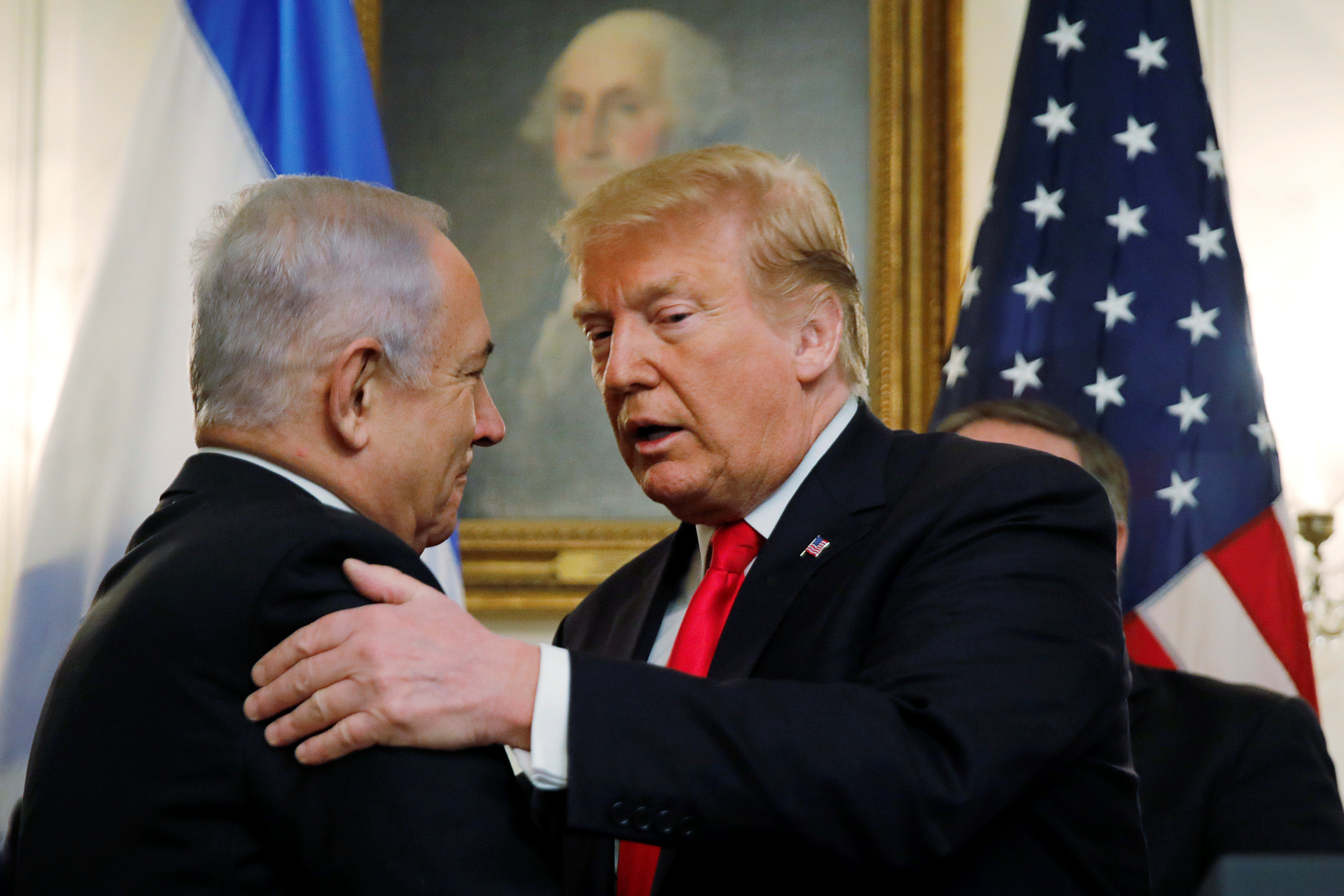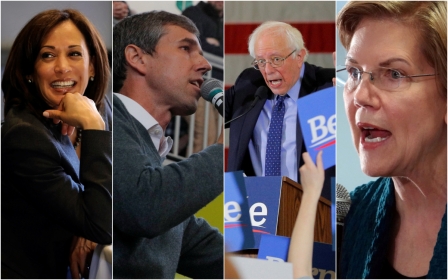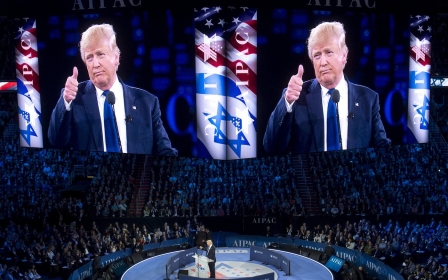Israel must keep 'security control' over occupied West Bank, US envoy says

While details of Donald Trump's so-called "Deal of the Century" to solve the Israeli-Palestinian conflict remain shrouded in secrecy, a top American official said Israel must maintain "security control" over the occupied West Bank.
Speaking on Tuesday at AIPAC 's conference in Washington, the US ambassador to Israel David Friedman said Israel's supporters should place their faith only in the Trump administration.
"Can we leave this to an administration that may not understand the need for Israel to maintain overriding security control of Judea and Samaria and a permanent defence position in the Jordan Valley?" said Friedman, using the term Israeli settlers use to designate the West Bank.
The ambassador, Trump's former personal lawyer, is a longtime supporter of Israel's settlement movement. In 2017, shortly after he took up his post, Friedman said the settlements, which violate international law, "are part of Israel".
He is among several top White House advisers - alongside Trump's son-in-law, Jared Kushner, and others - involved in crafting Washington's peace deal between Israel and the Palestinians, which has yet to be divulged publicly.
New MEE newsletter: Jerusalem Dispatch
Sign up to get the latest insights and analysis on Israel-Palestine, alongside Turkey Unpacked and other MEE newsletters
What is the AIPAC conference?
+ Show
- Hide
The American Israel Public Affairs Committee (AIPAC) is a pro-Israel lobby group based in the United States.
AIPAC bills itself as "a bipartisan organisation of US citizens committed solely to strengthening, protecting and promoting the US-Israel relationship".
The group has hosted a national policy conference every year since 1960, attracting some of the most powerful people and groups across the US.
In 1995, Bill Clinton became the first sitting US president to address the AIPAC summit.
Former US presidents George W. Bush and Barack Obama also spoke at the event during their time in the White House, while major politicians from both the Democratic and Republican parties attend the event each year.
The influence AIPAC wields on US politics came under increased scrutiny when Obama was president, after Israeli Prime Minister Benjamin Netanyahu addressed the US Congress without an official invitation from the Obama administration.
Many Democratic lawmakers boycotted Netanyahu's speech at the time, signalling a rift between pro-Israel lobbyists and some Democratic lawmakers, who saw the Israeli premier's speech as a clear insult to the US's first black president.
In response to the clear animosity between Obama and Netanyahu, AIPAC sought to ensure that support for Israel remains bipartisan in Washington.
AIPAC officials, including the group's president, issued an apology in 2016 after then-presidential candidate Donald Trump attacked Obama as "maybe the worst thing to happen to Israel" during his speech at that year's AIPAC conference.
"While we may have policy differences, we deeply respect the office of president of the United States and our president, Barack Obama," AIPAC President Lillian Pinkus said after Trump's address.
In fact, last month AIPAC said it was "proud [to be] engaged in the democratic process to strengthen the US-Israel relationship".
"Our bipartisan efforts are reflective of American values and interests. We will not be deterred in any way by ill-informed and illegitimate attacks on this important work," the group said on Twitter.
However, this year's AIPAC conference comes amid renewed criticism of the group's influence.
Democratic Congresswoman Ilhan Omar last month said she wanted to discuss the pressure in Washington to pledge "allegiance to a foreign country", referring to the pro-Israel lobby.
Her comments drew accusations of anti-Semitism, but many Jewish- and Muslim-American activists quickly came to her defence, saying the attacks against Omar were part of a concerted effort to curb debate around the Israeli-Palestinian conflict.
While top Democratic presidential candidates are skipping this year's conference, members of the party's old guard, including House Majority Leader Steny Hoyer, attended the summit in Washington.
Hoyer even slammed Omar, his Democratic Party colleague, in a speech at the conference on 24 March, pledging to maintain unequivocal US support for Israel.
US Vice President Mike Pence and Benny Gantz, an ex-Israeli army chief and the top challenger running against Netanyahu in next month's elections in Israel, also spoke at the conference on 25 March.
Continued Israeli security control and a military presence in the Jordan Valley, a substantial swath of land on the eastern edge of the West Bank, would be a non-starter for Palestinians and would make a contiguous Palestinian state impossible to achieve.
Trump administration officials have apparently sought to garner support for their plan from Gulf Arab states, including Saudi Arabia, but the details remain unconfirmed.
Past media reports have hinted that Washington wants to offer the Palestinians Abu Dis, an impoverished and neglected area near Jerusalem, as the capital of a future state, rather than East Jerusalem itself.
That was firmly rejected by Palestinian leaders, with Palestinian President Mahmoud Abbas saying in January 2018 that he expects the US plan to turn out to be "the slap of the century".
Trump's 'courageous stand'
On Tuesday, Friedman praised Trump for everything he's done for Israel since becoming president, including recognising Jerusalem as Israel's capital and moving the US embassy to the city.
"It was a statement by the leader of the free world that the United States stands with its friends and does not flinch from its enemies. And in a world of multiple false narratives, it was a courageous stand for honesty," Friedman said.
Friedman also welcomed the US president's decision to recognise Israeli "sovereignty" over the occupied Syrian Golan Heights on Monday, a move that was widely condemned by world leaders, human rights groups and legal experts.
"President Trump stood yet again resolutely and courageously with the people of Israel," said Friedman, of the Golan decision.
"If you don't see the power and truth of these moves, you may want to check your pulse. If you don't see President Trump as Israel's greatest friend to inhabit the White House, please take a deep breath and think about it some more," he said to a standing ovation from the AIPAC crowd.
Fears of West Bank annexation
The US president's Golan announcement has raised concerns among Palestinian human rights advocates that the Trump administration may also be willing to recognise Israel's potential annexation of the occupied West Bank.
Once an idea largely touted by far-right leaders in Israel, support for Israeli annexation of the Palestinian territory, in various forms, appears to be gaining support among Israelis of all political stripes, Haaretz reported earlier this week.
A survey conducted by the Israeli newspaper and released on 25 March found that 15 percent of the 800 Israelis polled said they would support the annexation of Area C of the West Bank.
Area C accounts for more than 60 percent of the occupied territory and encompasses nearly all of the Israeli settlements there.
Even more Israelis - 16 percent - said they supported the full annexation of the West Bank so long as Palestinians living in the area are not granted political rights, the survey found.
Only 11 percent of the survey respondents, which included 100 Palestinian citizens of Israel, said they backed full West Bank annexation if Palestinians are given their political rights.
Netanyahu also praises Trump
Friedman's comments at the AIPAC conference, which concludes on Tuesday, came on the same day that Benjamin Netanyahu, Israel's prime minister, delivered a speech remotely to the pro-Israel audience.
The Israeli premier heaped lavish praise on Trump during his address, saying the US president "again made history" by recognising Israel's hold on the Golan Heights.
"Israel holds the high ground, and we shall never, ever give it up. It is part of Israel," said Netanyahu, who is in the middle of a heated election race ahead of 9 April polls.
Many analysts have said Trump's Golan decision aims to provide a boost for Netanyahu's re-election chances.
Over the past few weeks, the Israeli prime minister has also been drumming up support for Trump and his Republican Party colleagues, many of whom appear to be working to make support for Israel a partisan issue in Washington.
On Monday, US Vice President Mike Pence accused Democrats of abandoning Israel, after several top Democratic Party presidential hopefuls skipped the AIPAC conference.
"Let me be clear on this point," Pence said, "anyone who aspires to the highest office in the land should not be afraid to stand with the strongest supporters of Israel in America."
Several top Democrats attended the AIPAC conference this week, however, in an effort to demonstrate that the party's support for Israel remains unequivocal.
Middle East Eye delivers independent and unrivalled coverage and analysis of the Middle East, North Africa and beyond. To learn more about republishing this content and the associated fees, please fill out this form. More about MEE can be found here.






